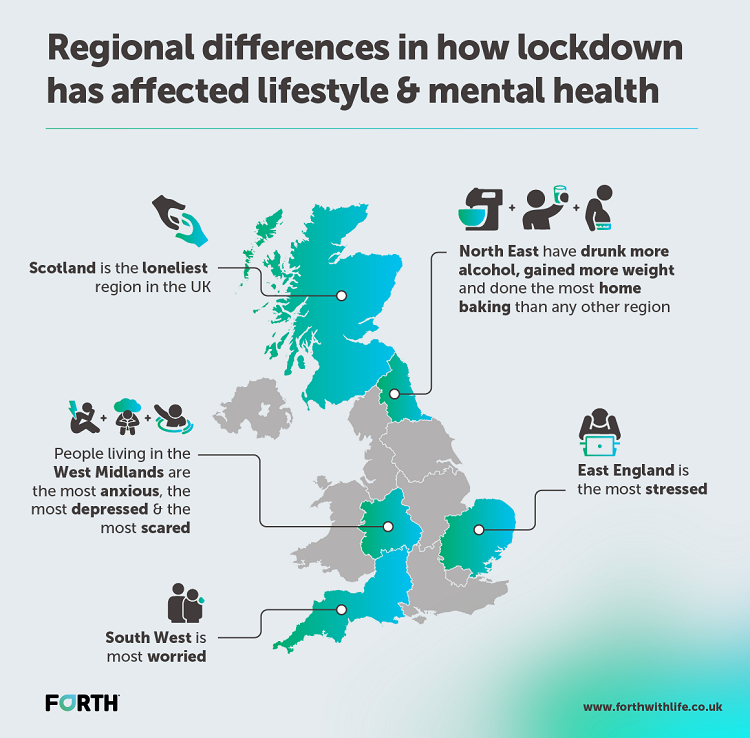The UK’s mental health issues have risen by nearly 110% according to a recent survey.
Based on emotions felt at least once a week, national anxiety levels have increased by 60.2%, stress by 45.7%, depression by 45.8%, fear by 107.1%, worry by 89.2%, and loneliness by 63.9%. Health and wellbeing tops the list of topics that the UK is worried about, closely followed by financial concerns.
The shift has also caused more than a third of the UK to get less sleep during lockdown, with 50% of these people losing over 1.5hrs in total. The knock on effect is 40% of the UK gaining weight and 30% consumed more alcohol.
Forth, a Welsh based health tech company, conducted the survey in early July as lockdown restrictions began to ease. The survey compared mental health issues before and after the Covid-19 lockdown, and lifestyle habits such as sleep, exercise and food consumption.
Overall, there is a reported increase in unhealthy food and alcohol consumption, and a decrease in sleep quality/time. The impact of these behavioural changes is seen through increased levels of weight gain and increased levels of anxiety, stress, depression, fear, worry, and loneliness.

The key findings from the survey are:
- 40% gained weight during lockdown.
- Just under 50% got less sleep during lockdown. This resulted in a 75.5% increase in stress felt every day and 51.7% increase in stress felt several times a week.
- 28.7% consumed more alcohol during lockdown.
- 48.1% consumed more unhealthy snacks during lockdown.
- 33.0% of 18-24 year olds did more exercise during lockdown, and 42.7% got more sleep during lockdown (18.0% got 1.5-2 hours extra).This is the only age group to get more sleep during lockdown.
- Over 50% were worried about their own health/wellbeing during lockdown, and over 50% were worried about someone else’s health/wellbeing during lockdown.
- The North-East of England had a 82.9% increase in anxiety felt ‘several times a week’. Contributing factors include significant increases in home baking (47%), alcohol consumption (37.1%), and weight gain (47.2%), with 66.2% out of work.
- In London, 33.7% ate more takeaways during lockdown, with 45.2% gaining weight. The impact was a 48.3% increase in anxiety felt every day and 76.9% several times a week.
- Scotland was the loneliest area in the UK during lockdown.
Commenting on the rise of poor mental health, Dr Nicky Keay, Chief Medical Officer at Forth, said:
“This survey indicates that the current pandemic has many consequences on people’s wellbeing and lifestyle choices, beyond the viral infection itself. The uncertainty surrounding the current situation can lead to people looking to behaviours to relieve negative emotions such as anxiety, depression and fear. Whilst some behaviours have been positive, such as increasing exercise, others might be less so such as increasing alcohol and intake of less healthy foods. Feeling isolated and lonely as unfortunate consequences of ‘social distancing’ which have resulted in some feeling socially distant.”
In late July, the government announced a national campaign to tackle obesity levels by introducing preventative measures. These measures include: banning junk food adverts before 9pm, offering Weight Watchers discounts and ending discount deals on “unhealthy” foods. The findings from the national survey support the need for preventative physical and mental healthcare, rather than reactive healthcare, as the national increase in mental health issues will cause irreversible damage.
Commenting on the findings, Sarah Bolt, CEO at Forth said:
“The findings from our survey confirm everything we already suspected: that the Covid-19 lockdown, generally speaking, amplified the nation’s unhealthy habits and caused a significant increase in poor mental health. The results reveal that as we re-open society and try to find a new normal, physical and mental health needs to be a priority. This is something that we need to take into our own hands as public health resources continue to be stretched. It is well known that physical health and balanced nutrition has a marked positive impact on mental health, which is central to our cause here at Forth. I believe it’s our duty to try and help people be their personal best in taking control of their health, both physically and mentally. Despite the green shoots seen by an increase in exercise levels among certain demographics, the picture for 2020 looks worrisome.”
Although lockdown has had a broadly negative impact on the nation’s general health and wellbeing, there are exceptions showing some green shoots of positive change. In Derry, 46.2% of those surveyed lost weight. Likewise, 17.6% of those surveyed from York started exercise for the first time.
The results also found that lockdown proved beneficial to 18-24 year olds, with the general anxiety felt by this age group reducing by 8% during lockdown. This age group also reported getting more sleep and more exercise.
With an overall rise in poor mental health, unhealthy habits, and a decrease in sleep, the impact of the Covid-19 lockdown is unsurprisingly negative. Forth’s survey has revealed areas and demographics that require significant attention to improve people’s general health and wellbeing.







